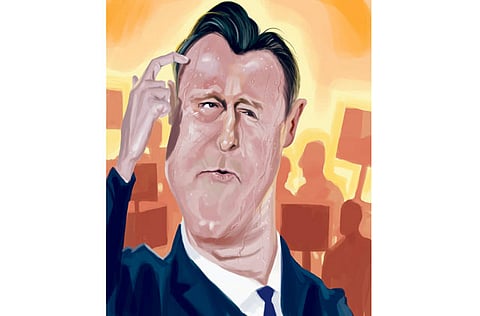London faces a summer of strike chaos over austerity
Unions are furious about the way coalition government is pushing changes rapidly

London is bracing for chaos on Thursday when public service employees will a stage a massive strike, along with teachers, over government austerity measures to reduce public debt.
London Underground is starting a series of strikes and taxi drivers are mulling bringing the British capital to a halt in protest against planned route closures and bans during the Olympics next summer.
Though Underground strikes are staged repeatedly, their coincidence with about 750,000 public sector workers, teachers and job centre staff will be part of what might be Britain's worst labour stoppages in decades.
Government policies imposing tax rises, benefit cuts, a wage freeze and spending cuts are adversely affecting working families' incomes. All this is exacerbated by higher inflation and unemployment. As these measures are not reflected in economic growth or any macroeconomic improvement, people are more wary about the future.
The National Association of Head Teachers is also planning to poll its members on a possible walkout in the autumn in what would be its first strike action in its 114-year history. This is another indication of hows widespread resentment is in society.
Many other unions are planning industrial actions in protest against cuts resulting in compulsory redundancies, reduced pay and increased workload. The morale among employees and the working middle-class is shocking and resentment to the coalition government's policies is growing.
Many are starting to question the stated goals of the austerity measures the Conservative-Liberal Democrat coalition is taking to cut the deficit and avoid a debt crisis.
Sense of injustice
In times of economic recession, every-one in a society expects to suffer, but when the policy targets a certain strata of society you can't avoid the sense of injustice. These strikes and other protests are not only due to the government raising the retirement age to 66 from 60, but for the dire conditions workers find themselves in: job cuts, rising inflation, declining wages, increasing taxes on middle-class workers, scrapping of social benefits for those in need, and privatising services under the slogan of reform.
The government might be thinking of shedding its responsibilities to lessen liabilities, but it's actually punishing the core of society for not being private investors.
The unions, especially public sector unions, are furious about the way the coalition government is pushing changes rapidly and without proper consultations or consideration for its impact on the public.
Chancellor George Osborne is only listening to advisers from the private sector — mainly investors, bankers and financial bosses — and is not ready to discuss changes with those concerned.
Again, everybody agrees that these are rough times for the economy and all of society must sacrifice.
But most of the government cuts are targeting workers, while big businesses and financial businesses in particular are being incentivised with the cliché that Britain must encourage bankers and fund managers to stay in the City (London financial district) because they are a main driver of economic growth.
People still see the financial sector not beig punished although it was the main culprit of the financial crisis and the subsequent recession. It was actually bailed out by public money — taxes workers pay — and resisted reform that didn't even match in theory what the government is doing to workers in reality.
A media campaign is accompanying the crude policy of cuts and savings. Pensions, especially public sector and similar schemes, are portrayed as gold-plated retirement packages.
Few top earners are highlighted, while millions of average earners who are suffering dire economic hardships are purposely ignored to justify the clampdown on people's right to a decent retirement after years of hard work and paying taxes.
The chancellor had the backing not only of bankers and investors, but of international institutions mentoring their cause like the IMF. In its latest report on the UK economy, the IMF said that debt-reduction measures adopted by the coalition government should continue, but warned of its risks to growth prospects.
Recovery
The British economy is slowing down again and seems unlikely to recover soon, while cuts are adversely impacting consumer spending — the main engine of growth. We might not have to wait long to see a depression like that of the 1930s. Actually the wave of approaching strikes is a reminder of what preceded the Great Depression.
It might not only be economic wisdom that is driving the government; its critics say it could be for ideological reasons. In such a case, liberal Democrats would have abandoned the core of their ideology and turned conservative.
In the 1980s, Margaret Thatcher's Conservative government adopted a privatisation programme and it seemed at the time that many Brits would become shareholders in the public companies sold to investors. Current coalition government policies are in reality trying to copy that in a more aggressive way — it's recession time.
The simple explanation in people's minds is that when you reward investors who put their money to work for them and punish workers who work to earn their money is that you're pushing middle-class workers to becoming investors.
That's not workable; you can't have a society of investors, bankers and financial dealers. You would still need people to work and you can't import all workers from Eastern Europe or overseas.
If the wave of strikes and other protests continues and the government holds to its position instead of compromising with the unions, Britain might not wait until after the Olympics next summer to face what Greece suffered after it hosted the Olympics in 2004.
Dr Ayman Mustafa is a London-based Arab writer.



